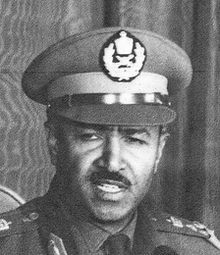Aman Andom facts for kids
Quick facts for kids
Aman Andom
|
|
|---|---|
|
አማን አንዶም
|
|

Andom addressing a press conference following the 1974 coup
|
|
| 1st Chairman of the Derg and de facto Head of State of Ethiopia | |
| In office 15 September 1974 – 17 November 1974 |
|
| Monarch | Asfaw Wossen1 |
| Preceded by | Haile Selassie (as Emperor) |
| Succeeded by | Mengistu Haile Mariam |
| Member of the Ethiopian Senate | |
| In office 1964–1974 |
|
| Appointed by | Haile Selassie |
| Personal details | |
| Born | 21 June 1924 Tsazega, Hamasien, Italian Eritrea |
| Died | 23 November 1974 (aged 50) Addis Ababa, Ethiopia |
| Cause of death | Assassination by gunshot |
| Political party | None (military regime) |
| Military service | |
| Allegiance | |
| Branch/service | Ethiopian Army |
| Years of service | 1949–1974 |
| Rank | Lieutenant general |
| Battles/wars | Korean War Congo Crisis 1964 Ethiopian–Somali Border War |
| 1Crown Prince Asfaw Wossen Tafari had been declared "King-designate" by the Derg but made no move to acknowledge the title, instead recognizing his father, Haile Selassie I, as remaining the de jure Emperor | |
Aman Mikael Andom (Amharic: አማን ሚካኤል አንዶም; Tigrinya: ኣማን ሚካኤል ዓንዶም; born June 21, 1924 – died November 23, 1974) was an important Eritrean general. He became the first acting head of state of Ethiopia after Emperor Haile Selassie was removed from power. Aman was also the first Chairman of a military group called the Derg. He took this role after a coup d'état (when a group takes control of a government) on September 12, 1974. He served for a short time until he was killed in a fight with people who used to support him.
Contents
His Early Life
Aman Mikael Andom was born in a village called Tsazega in what was then Italian Eritrea. He grew up with four brothers and sisters. Aman was a Lutheran, which is a type of Christian faith.
A Brave Military Leader
Aman was educated in Sudan. He returned to Ethiopia with British forces who helped defeat the Italians. These forces also helped Emperor Haile Selassie get his throne back. Aman then had a very successful military career. He led Ethiopian soldiers in important conflicts like the Korean War and the Congo Crisis.
In 1962, he was promoted to a high rank, major general. During the 1964 Ethiopian–Somali Border War, he earned a special nickname: the "Desert Lion." This was after a big battle against Somali forces in an area called the Ogaden.
Leading Ethiopia
Aman's official title was Chairman of the Provisional Military Administrative Council. This group was better known as the Derg. He acted as the Head of State. The military government had even said that Crown Prince Amha Selassie would be the "King-designate." However, the Prince never accepted this title.
Aman had some contact with the military officers as early as February and March 1974. By July, he was made the chief of staff for the military group. On September 15, 1974, the military group removed Emperor Haile Selassie from his palace and put him in prison. Three days later, this group appointed Aman as their chairman and the head of state for Ethiopia. At this time, the group of soldiers officially named themselves the "Provisional Military Administrative Council," or the Derg.
Challenges as Leader
From the very beginning of his time as chairman, General Aman had disagreements with most of the Derg's members. They argued about many important things.
- Size of the Derg: Aman thought the group was too big and hard to manage.
- Eritrea Policy: As an Eritrean himself, General Aman wanted to find a peaceful solution with the Eritrean Liberation Front (ELF). Most of the Derg, however, wanted to use military force to defeat the ELF. Aman even visited Eritrea twice. He gave speeches saying that the new government would bring peace and prosperity. He also promised to investigate crimes committed by the army against Eritreans.
- Punishment of Officials: Aman refused to agree to the execution of former high-ranking officials. These included two former prime ministers and several members of the royal family. This disagreement made his relationship with the Derg very difficult.
At the same time, the Derg started removing opponents from the military. On October 7, 1974, soldiers loyal to the Derg attacked an engineers' camp. They killed five people and arrested others. This event showed that the revolution would no longer be peaceful.
General Aman tried to get support from other parts of the army and the country, where he was popular. On November 15, 1974, he sent a message to all military units. This message was very critical of the Derg.
His Final Days
Two days later, during a meeting of the Derg, Mengistu Haile Mariam demanded that 5,000 soldiers be sent to Eritrea. He also wanted six imprisoned Imperial officials to be executed. Aman refused these demands. He then resigned from his official positions and went home. He secretly tried to get help from his supporters, especially those in the Third Division of the army. However, Mengistu found out about these messages.
On November 23, 1974, Aman died in a fight at his home. Soldiers had been sent there to arrest him. That same night, the political prisoners that the Derg wanted to execute were taken from their prison. They were then executed and buried in a mass grave. It seems that General Aman was no longer useful to the Derg and was becoming a problem for their power.
See Also
 | Bessie Coleman |
 | Spann Watson |
 | Jill E. Brown |
 | Sherman W. White |

